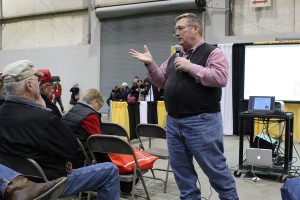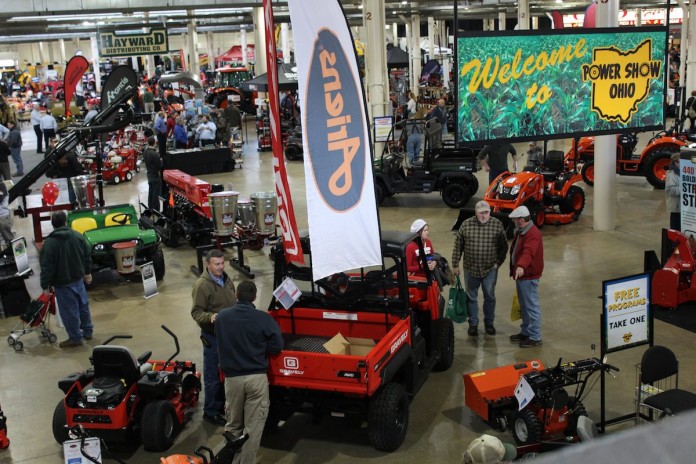COLUMBUS — Attendees to the Power Show Ohio had to make one less trip outdoors during the annual show, held Jan. 29-31 at the Ohio Expo Center.
That’s because organizers managed to get all the exhibitors into two buildings — cutting down on the trips spent getting from one building to the next.
And, that was welcome news, amid a bitter cold wind that swept across the grounds, bringing ice and snow.
“It gives people more time to visit with exhibitors, as opposed to walking between buildings,” said Dennis Alford, show manager.
The show made one other major change — it started on a Thursday and ran through Saturday, instead of running Friday through Sunday. Alford said the change in dates seemed to be going well.
The show, which is sponsored by the Ohio-Michigan Equipment Dealers Association, features agricultural equipment, lawn and garden equipment, as well as landscape and recreation.
The organizers have conducted a survey the past few years, which determined the main reason people come is to see the new equipment and technology, and to get more information directly from company representatives.
Educational sessions
In addition to the equipment displays, there were educational sessions all three days, that included staff from Ohio State University Extension and Ohio Farm Bureau Federation.
Dale Arnold, OFBF’s director of energy, utility and local government policy, gave a pipeline development briefing Friday and Saturday.

He sees a lot of volatility in the future of energy markets, with some companies predicting $5 for a gallon of gasoline by the end of the decade. On the energy front, he said about a third of coal-fired power plants have been decommissioned, another third is awaiting upgrades, and the other third is in limbo.
In general, the nation is transitioning from “large, centralized (energy) systems, to a lot of decentralized systems,” he said.
That includes new resources, like shale gas, and all the gasses and oils that come from shale. He expects the state will see 38,000 miles of pipeline infrastructure built over the next 10-15 years — a good reason for landowners to be prepared.
Involves everyone
Even if a pipeline project is a few miles from your property, you still need to know how it impacts your community and your farm or business.
“Everyone is going to be involved with this in some way, shape or form,” Arnold said.
There are many questions landowners should ask, when approached by a pipeline company. Those include the material that will be transported, distance, diameter and pressure of the pipeline.
You also should consider the value of your property according to soil type and real estate value, the value of lost crops, timber and any other potential uses for your land.
And you need to think about the cost of rent, or other outside costs you may incur, during the year or two that your land is unusable, Arnold said.
Landowners should consult with experienced attorneys before signing lease agreements, and should also review the requirements of eminent domain.
Arnold said eminent domain applies when the pipeline is essential for public convenience and necessity, and can be applied any time a federal regulatory commission is involved.
Private agreements
But Arnold said eminent domain is used less than 2 percent of the time for these types of cases, because private agreements are almost always met.
He reminded landowners to be good negotiators, to ask the right questions and consider all the factors.
Pipeline agents typically don’t lie, but on the flip side, “you need to know what questions to ask.”
He warned against group leases and thinking that what the neighbors are doing is what you should do. Each landowner’s agreement is “as unique as your fingerprint,” and should be considered on an individual level, he said.
Other educational sessions included advice for making the farm bill commodity decision, Ohio’s drainage law, landowner liability issues and a grain marketing seminar.
For more information about pipeline leases or a copy of Arnold’s presentation, email him at darnold@ofbf.org.
He also has a list of recommended attorneys who can help landowners with their leases.


















